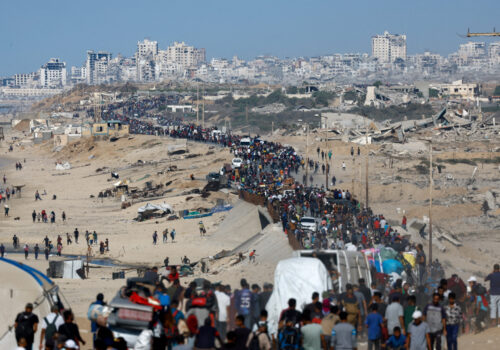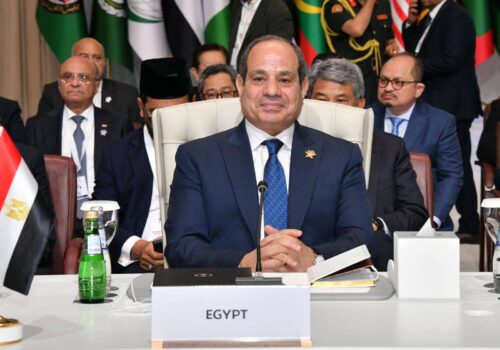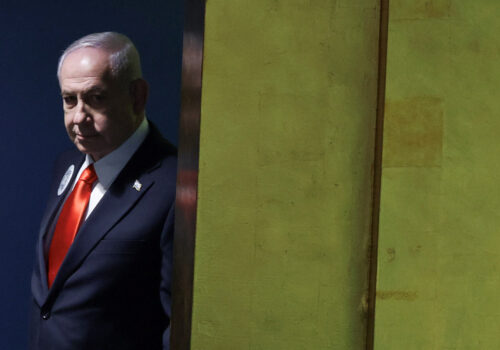The important change needed in UNSC’s Gaza resolution: Control over the money
For US President Donald Trump’s twenty-point plan for Gaza to turn into a decisive win, early decisions are absolutely crucial. The demilitarization of Gaza is crucial to the success of the Trump plan, and it is essential to have the ability to use both military force and economic power to make demilitarization succeed. The United States’ proposed United Nations Security Council resolution on Gaza hangs in the balance, with many good elements, but there are two areas—control over the money, and the Gazan civil service—where a four-word change could make a difference between a lasting peace or only a short cease-fire. The stakes in the next few days are that high.
The current draft resolution has many strong elements, and the United States should resist efforts by other Security Council members to weaken it. The draft resolution gives international legitimacy to the Trump peace plan, including the Board of Peace (BoP), an International Security Force (ISF) with a robust authority to demilitarize Hamas and other terrorist groups, and civilian “operational entities” under the BoP, including an international oversight body and “a Palestinian technocratic, apolitical committee of competent Palestinians” from Gaza.
One of the “operational entities” could be the Gaza International Transitional Authority (GITA). It was referenced by name in the Trump plan but is not mentioned specifically in the draft resolution—perhaps because GITA and former UK Prime Minister Tony Blair met some resistance from Egypt and elsewhere. The relationship between international oversight and the Palestinian committee is ambiguous in the draft resolution, and this is where improvements could make the difference between success and failure for the Trump plan.
The US experiences in Bosnia and Iraq show the importance of getting the early decisions right. In Bosnia, United Nations (UN) Security Council resolution 1031 (1995) provided a one-time-only authorization to set up the Office of the High Representative and an International Force (IFOR) to enforce the Dayton Peace Agreement. Like the ISF for Gaza, IFOR was not a UN peacekeeping force, keeping it out of the hands of a Russian or Chinese veto and the UN bureaucracy, either of which would have made a lasting peace impossible. However, the United States focused more on the military side of implementation, leaving civilian implementation in the hands of Europeans who, in the first crucial months, tried to compromise decisions that should not have been compromised. Bosnian Serb recalcitrance, in particular, threatened to unravel the peace. There are many celebrated but unpublished stories about how US Ambassador Richard Holbrooke and his team rescued the peace deal in a February 1996 conference in Rome. The result was not perfect, but Bosnia has not fallen back into war for almost thirty years.
The US experience in Iraq shows how early, bad decisions are often unrecoverable. The United States delayed deciding how to administer Iraq and was not ready when Baghdad fell to US forces. Washington’s decisions to disband the Iraqi army and extend de-Baathification down to the firqa level (i.e., beyond what was necessary) led to an insurgency that crippled Iraq. Failures to understand the role of money in Iraqi elections, and to provide border security from day one, allowed Iran to gain the upper hand in Iraqi politics. The decision to let Iraqi political parties appoint individual ministers led to crippling corruption and the deeply unpopular muhasasa system.
The biggest challenge to lasting peace in Gaza is Hamas’s unwillingness to lay down its arms. Both Trump and the Israeli government are adamant that Hamas must be disarmed. Arab governments will not contribute to Gaza’s reconstruction if Hamas can keep its weapons, even if limited to AK-47s, to intimidate the locals and allow Hamas to attack Israel whenever it wants. This would result in an Israeli counterattack that would likely destroy anything that was rebuilt. Gaza will not have peace or reconstruction unless Hamas is disarmed.
At the same time, no Arab force likely wants to fight Hamas to take away its weapons. Jordan’s King Abdullah II said this publicly in October.
Instead, disarmament will have to proceed along two tracks. First, paragraph seven of the draft resolution gives the ISF the mandate “to use all necessary measures” for “ensuring the process of demilitarizing the Gaza Strip, including the destruction and prevention of rebuilding of the military, terror, and offensive infrastructure, as well as the permanent decommissioning of weapons from non-state armed groups.” The ISF will need some Western special operations forces or contractors able to carry out targeted raids on Hamas remnants and their weapons caches. But the language in paragraph seven is strong.
There needs to be a second track: Take away Hamas’ control over the money, jobs, and contracts in Gaza. This was how Hamas built up its fighters, weapons, and tunnels. Keeping money away from Hamas has to be a core mission of the BoP’s “operational entities.” This will require initial international control of Gaza’s tax revenues, government contracts, and key appointments to prevent Hamas from intimidating local Palestinians, as it will certainly try to do. This can be phased out when it is unnecessary, but international control is absolutely essential for both Israel and Gaza at the outset.
Just four additional words, italicized here, added to paragraph four of the draft resolution, would clarify that the BoP’s “operational entities shall be responsible for day-to-day operations of Gaza’s civil service, finance, contracts, and administration.” The present draft is ambiguous on this point, and to avoid a knock-down-drag-out bureaucratic argument, the resolution should make it clear that the entities created by the BoP, not just the Palestinian committee, are responsible for Gaza’s finance, contracts, and key personnel. Hamas will no doubt object, and Egypt may as well, but no government will invest billions of dollars if Hamas’s disarmament is not a priority—and keeping the money away from Hamas is the best nonmilitary way to ensure Hamas is unable to rebuild and rearm.
Control over the money, contracts, and key officials in Gaza is absolutely essential for the success of Trump’s plan. In the next few days, the United States and its regional allies should work to strengthen the draft resolution by ensuring that the operational entities created by the BoP will have the ability to ensure that Hamas can never come back to power.
Thomas S. Warrick is a nonresident senior fellow with the Scowcroft Center for Strategy and Security and the Scowcroft Middle East Security Initiative in the Middle East Programs at the Atlantic Council. From 1997 to 2007, he served in the US Department of State on Middle East and international justice issues, including heading postwar planning on Iraq from 2002 to 2003.
Further reading
Wed, Oct 15, 2025
Twenty questions (and expert answers) about the next phase of an Israel-Hamas deal
New Atlanticist By
What will follow part one of the cease-fire deal brokered by the Trump administration? Atlantic Council experts share their answers.
Thu, Oct 9, 2025
Amid Gaza cease-fire hope, where does the Egypt-Israel relationship stand?
MENASource By Shahira Amin
Israel’s Doha strike shifted the dynamics with Cairo—stemming from concerns that Egypt may be next in Israel's crosshairs.
Fri, Sep 26, 2025
For an increasingly isolated Netanyahu, it’s money time with Trump
MENASource By Shalom Lipner
Amid growing international criticism, the Israeli Prime Minister is playing his ace—or rather, his Trump—card in Washington.
Image: United States Ambassador to the United Nations Mike Waltz speaks during a high-level meeting for U.N. Security Council members on the situation in Gaza at U.N. headquarters in New York City, U.S., September 23, 2025. REUTERS/Shannon Stapleton


